

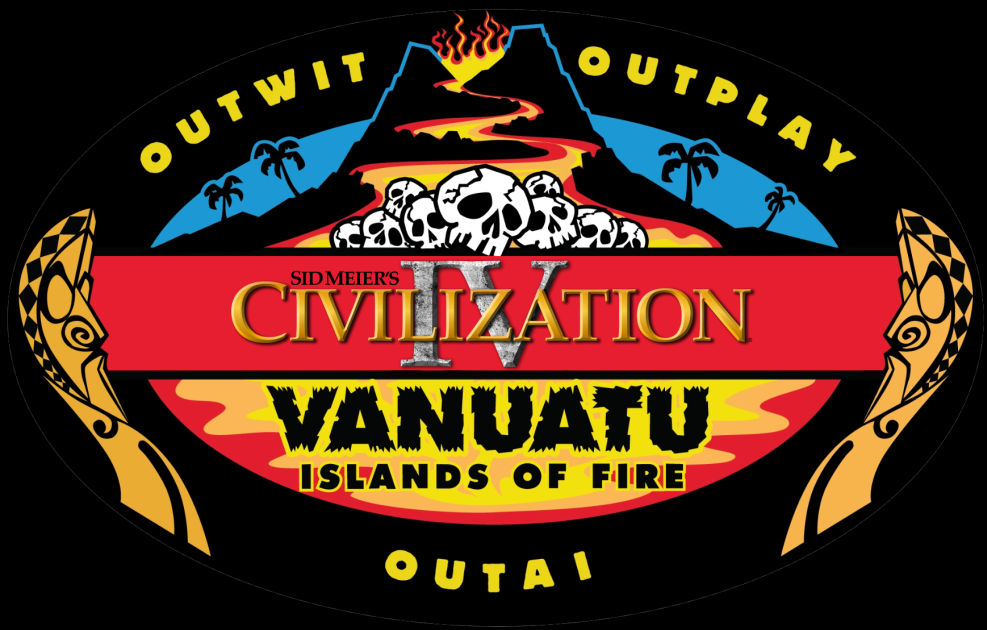
This summary for Game Four was written by Eauxps I. Fourgott. Many thanks for volunteering to put this report together! 
Game 4 hosted a hodgepodge of leaders who had largely put out unimpressive performances in previous seasons. The main dynamic of this map was the positioning of two higher peaceweight leaders, Joao and Wang Kon, surrounded by a group of low peaceweights - Mao Zedong, Peter, Qin Shi Huang, and Gilgamesh - making it look very likely that those two leaders would get dogpiled at some point. Whoever got the biggest share of spoils from their demise might well end up as the game winner. The last leader, starting in a corner of the map where he'd hope to stay out of the way and be ignored, was Sitting Bull, but while he wasn't in quite such a precarious position as the other two higher peaceweights, he did start right next to Gilgamesh, leaving him little hope of being left alone the whole game. Between this more private potential conquest, his successful past performances that had made him a Pool One leader, and the best capital site on the map, Gilgamesh appeared to be in a great position and was the biggest favorite in the picking contest so far this season.
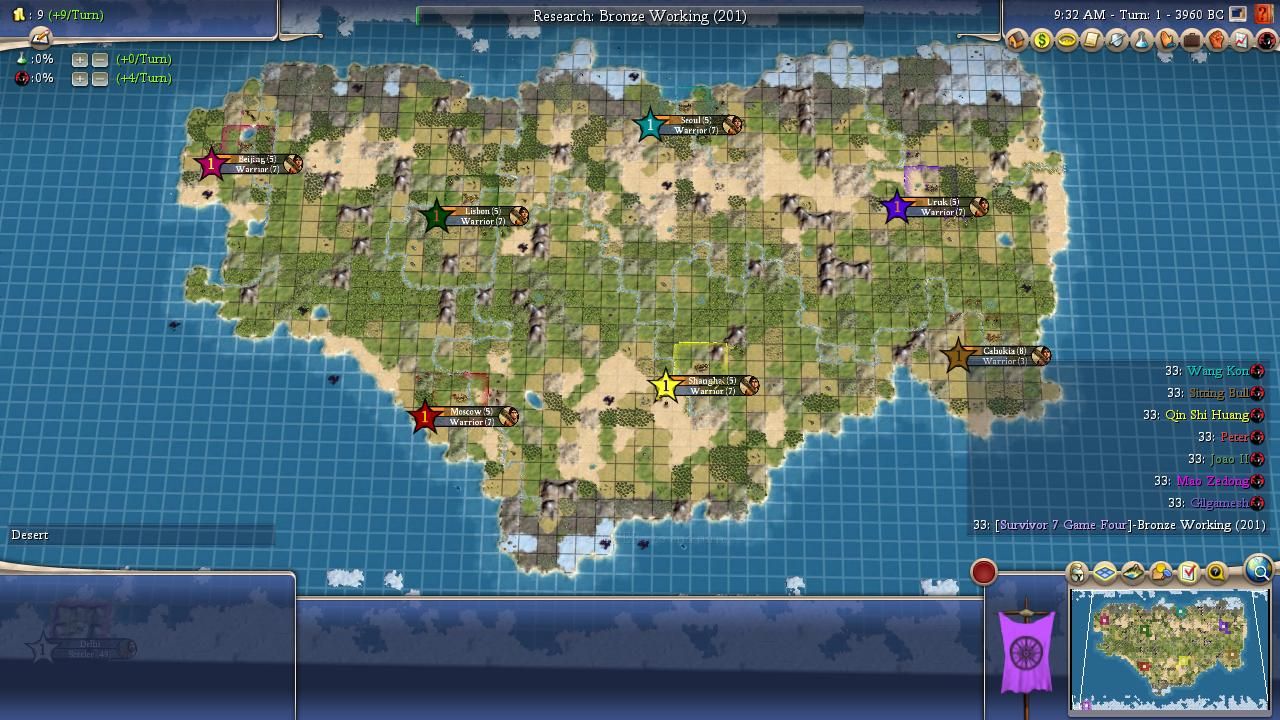
The early game for this matchup quickly became defined by a large number of bad or bizarre plays by the various leaders. It was an odd sequence where everybody seemed to just be bumbling around - nobody looked particularly great here, and the barbarians in particular seemed to be giving everybody a rough time of it. Peter and Qin both lost cities to the barbs early on; Gilgamesh saw a gold resource at his capital get pillaged after it had taken him 30 turns to get it hooked up in the first place, and later allowed the barbs to pillage his copper as well. These were mostly minor annoyances, nobody getting severely hamstrung, but they still spoke to the level of trouble these leaders were having. Most of the fledgling civs also lacked sources of culture for all too long; Sitting Bull didn't tech Mysticism until Turn 50, and as late as Turn 80 all three western leaders still lacked it.
There were more specific follies as well. Wang Kon had a horribly slow rate of expansion; on Turn 50 he still had only three cities on the map, two of them tied up on lengthy wonder builds that he would ultimately never even finish. Sitting Bull had a cramped starting position and lacked any really good city sites to expand into, but the cities he did found were either safe backline locations that didn't extend his reach at all, or else super-aggressive forward plants that had no defensive advantages and would be hard to hold. Qin had a strong start before the aforementioned barb city capture stunted his momentum, but he also neglected to add any roads to his territory for ages (The Wheel not coming in until about Turn 70) and that severely hampered his early economy. He also made one of the more bizarre religious moves we've ever seen: after founding his own religion of Taoism to start the game, later on he actually briefly converted AWAY from it to Wang Kon's Confucianism instead. He would eventually swap back, but this just underscored the oddity of this opening.
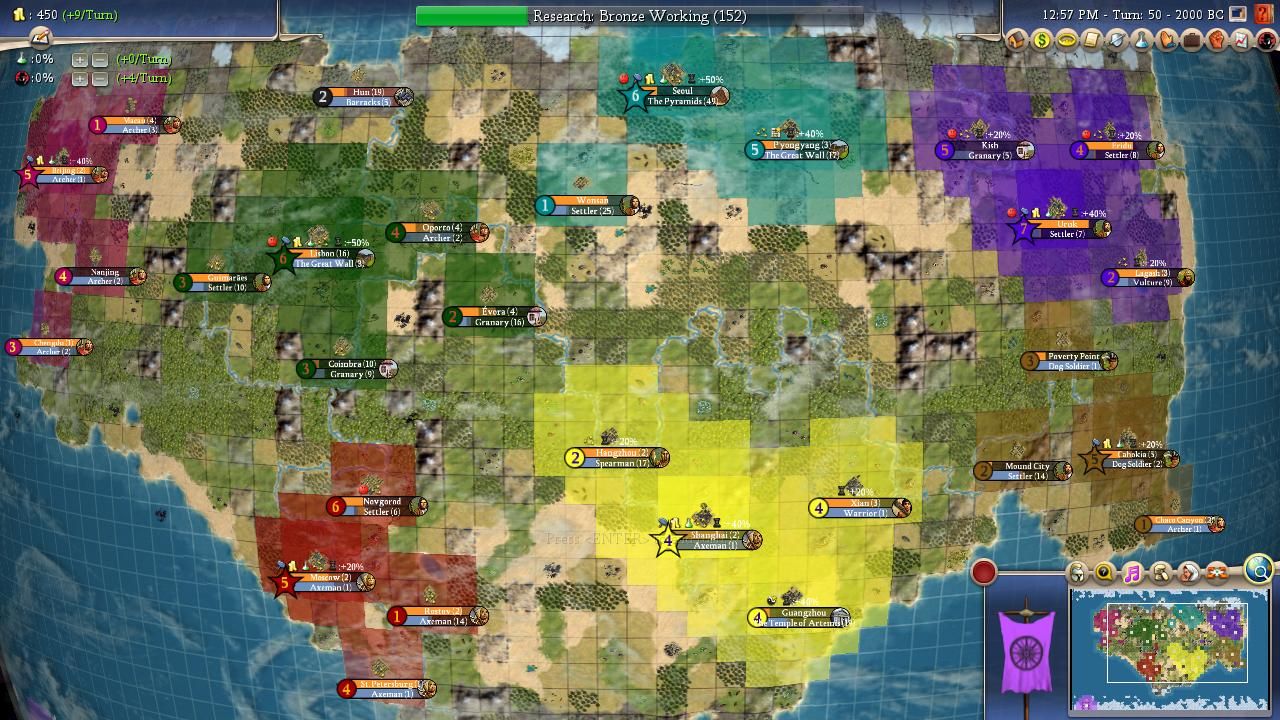
Still, by the end of the landgrab, the field was getting clearly divided into leaders that were doing better or worse. Gilgamesh was the score leader and clearly looking the best; his free Creative culture had helped a lot in a game where most leaders struggled to expand borders, and he also had one of the map's highest city counts, plus an abundance of early happiness resources so that those cities could grow nice and big. He'd avoided anything too silly in this opening, although the fact that he barely led by a hundred points despite everybody else's blunders betrayed that his own effort hadn't been nearly as effective as it could have. Nevertheless, the picking contest's favorite was in the driver's seat right now. Qin was also still competitive on the leaderboards despite one of the lowest city counts, thanks in part to his strong early culture from both an early religion and a Stonehenge build, while Peter and Joao were middling in terms of score but, along with Gilgamesh, had the highest city counts on the map, and thus the potential to become quite strong. On the flip side, Mao, Wang, and Sitting Bull all had poor city counts and no particular advantage at this point. Mao's opening had simply been tepid and not done much of anything, Wang's very slow expansion rate had badly hampered his growth curve, and Sitting Bull was both weak and very vulnerable to Qin and, in particular, Gilgamesh. These two eastern leaders had a ton of border tension, and conflict was bound to come sooner rather than later.
So nobody was surprised at all when the game's first war turned out to be Gilgamesh attacking Sitting Bull. It was clear that Gilgamesh was in the better position, and he quickly solidified that by killing a roving Native American stack in the field, then rushing and capturing the border city of Poverty Point. He wasn't immediately able to make headway against Sitting Bull's remaining cities - Bull was at least making a better defense than Zara and Lincoln had in the last two games - but Construction was already on the way for Gilgamesh, and it looked like he'd be assuming a dominant position sooner rather than later. Meanwhile, in the center of the map, Wang Kon decided to troll HIMSELF by attacking Joao, the neighbor who had been least likely to hate his guts. Wang caught Joao by surprise, bringing an attack stack that far outnumbered the garrison of his targeted border city... but the attacking stack was composed almost entirely of spearmen, who don't do so great at direct assaults. Joao cut them to ribbons, holding onto his city, and it was already clear that Wang had made a very poor decision. It seemed like he didn't even want to be here today, as the diplo screen showed that he was a big ball of annoyance, hating everyone else except Sitting Bull. Maybe he was just trying to cash out with an early exit.
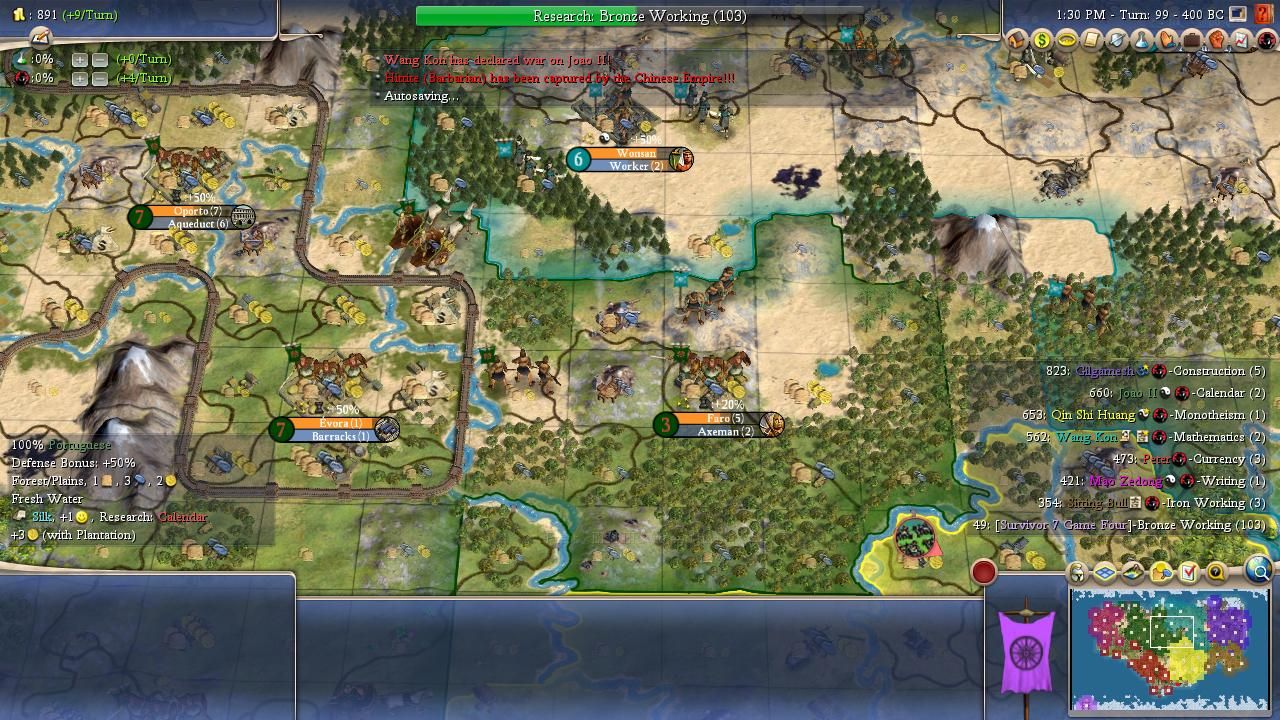
If that was indeed the case, then the other leaders were more than willing to oblige. Shortly after the initial attack, Qin marched a stack north and declared war; Peter soon joined the fun as well, moving through Joao's territory to get at the Troll King. It seems nobody was interested in his antics today. Wang had already been arguably the weakest leader before the wars broke out, and there was no way he was going to survive a 3v1 situation. The Protective trait didn't make any difference here, as the others quickly carved Korea up. Peter and Joao each captured two cities, and despite lacking any catapults, Qin brought overwhelming enough force to power through and take three on his own. He got one more too, a tiny fishing village to the north, but decided to show just what he thought of Wang by burning it to the ground as he scored the kill. This had not been much of a game by Wang; he founded one of the opening religions, but that was about his most impressive feat. He failed to expand well, failed to grab wonders, failed to convert a sneak attack into a single city capture, and failed to make friends with anybody as he was swiftly dogpiled. He had at least succeeded at trolling some of the picking contest by foiling those who picked Sitting Bull as First to Die, but on the whole it had been a disappointing outing from the fan favorite.
Sitting Bull hadn't been doing much better in the meantime, but he at least had only one serious foe to deal with and put forth a credible effort at defense, delaying his demise a bit longer. There was a brief spot of hope for him as, in the process of dying, he managed to randomly capture a barbiarian city far to the northwest, deep in Joao's territory... but then Mao declared war, captured the city, and handed it over to J-man instead, essentially flipping the bird at Sitting Bull. Mao actually was able to capture one core city as well, but Gilgamesh took all the rest to secure the almost-solo kill. The best thing that can be said about Sitting Bull's game here is that he managed to avoid dying first. It's true that he was dealt a pretty terrible hand, but it's also true that he played it pretty terribly, making all sorts of poor decisions and not putting up nearly as spirited as a defense as he could have. Even on the defensive here, he had lost several big stacks of units that foolishly tried to attack Sumeria, making his own cities that much easier to conquer. It was a performance to forget.
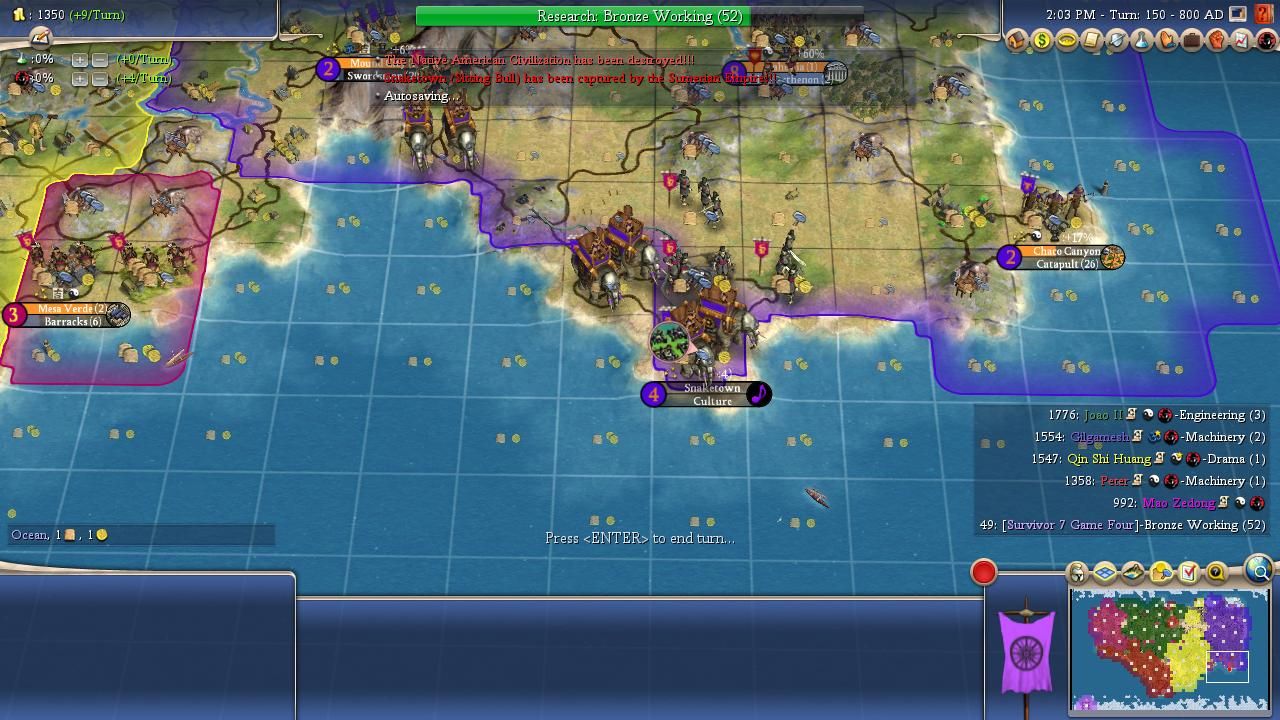
In the aftermath of this initial set of wars, Gilgamesh was looking pretty solid. While the land he had conquered wasn't very high quality, it was still most of a second civ's worth of land and more than anybody else had been able to grab, and he was right in the thick of it. However, contrary to expecations at the start of this war, he was NOT running away with the game. Qin, now his only neighbor, was running even with him on the scoreboard in the wake of his own successful campaign against Korea; those four city captures (Qin refounded the city that he had razed) had made a huge difference, transforming him from being a bit too small to really compete into one of the game's big dogs. Gilgamesh's own failures to efficiently exploit his favorable start had also made their mark on the game, causing him to only be among the top leaders instead of a clear frontrunner.
But it was a surprising Joao who had taken the lead! J-man had only taken two Korean cities, but his peaceful expansion had been strong enough to still put him ahead of the pack, and his cities were getting really solidly developed now. The fact that Joao's peaceweight is just a little lower than Wang Kon's and Sitting Bull's had proven critical, as the aggressive leaders, hating those two more, had chosen to go after them first and allow J-man to properly establish his empire while forging some bonds via the shared war. And Qin's religion was now an important factor in the game, as it had spread far and wide and every remaining leader except for Gilgamesh, who practiced his own self-founded Hinduism, had converted to it. The resulting diplomatic modifiers gave Joao an ever better foothold in the game, preventing his neighbors from hating his guts, while at the same time leaving Gilgamesh on the outside looking in and thus in not as great of a position. Thus instead of an early Joao dogpile or Gilgamesh snowball, both were now in close contention for the victory.
At this point the game settled into a period of peace. While Gilgamesh was practicing a different religion from everybody else, that still didn't make him a hated leader by any means; it just meant that everybody was pleased with him, as opposed to almost everybody being friendly with him as was the case for the other leaders. As the turns stretched on with little happening, Gilgamesh slowly rose in the scoreboard as he developed his conquered lands and unlocked their full potential. Soon enough Qin was a definite step behind him, as instead Gilgamesh and Joao were now neck and neck for first place. Qin was instead vying for third place with Peter, who himself was in a decent position, just not quite as impressive of one as the top three leaders. All four leaders were quite close, within 400 points of each other on the scoreboard. There was no runaway here, as Gilgamesh and Joao were largely splitting the wonders and Qin ended up narrowly edging out Peter for the Liberalism prize. The only leader who was well and truly out of it was Mao, who simply had not accomplished anything in this game. He was far smaller and his economy far poorer than any of the other leaders, his best hope at this point to avoid notice and slip through to the Wildcard game.
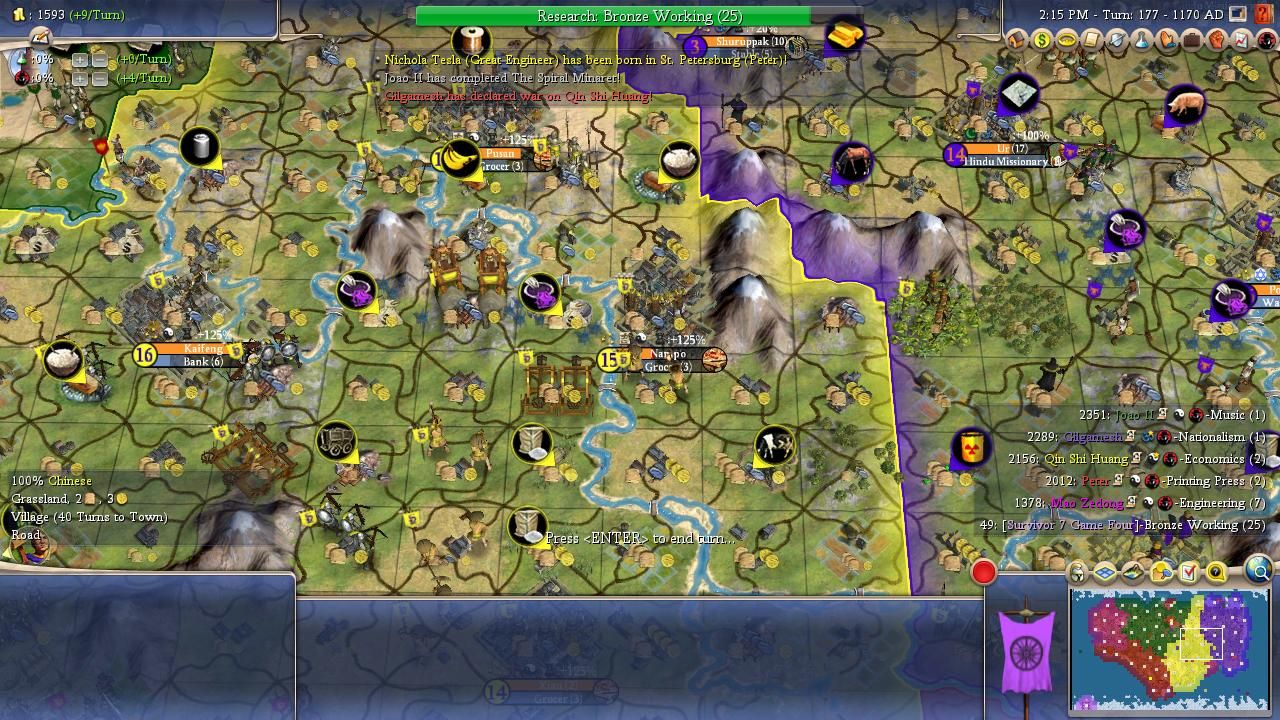
Finally, sparks started to fly again. First Gilgamesh decided to attack Qin, his only neighbor. This conflict wound up being disappointingly short and inconclusive, though; they threw a couple of stacks at each other, then signed peace before a proper siege could even be mounted. As a result, this war accomplished nothing except for cooling Qin's attitude towards Gilgamesh and setting up a potential repeat conflict. In the west, though, a much bigger war was soon afoot, as Peter declared war on Joao and Mao soon attacked as well. Joao had been able to delay the dogpile, but he had not been able to prevent it completely, and as each opponent quickly took a city, it looked like he might crumple, done in by the 2v1. But then the attacks stalled out, and J-man stabilized. He had managed to unlock Curassiers early in the war, and those seemed to be making the difference against the opposing medieval armies. After stalling out the attacks, he was even able to go on the offensive, taking back the city that he had lost to Peter, then grabbing a couple of exposed Russian cities before starting to march into Peter's core. Make no mistake, this was by no means a fast conquest, but as the turns went on, it became clear that Joao was getting the better of this war. Mao and Peter had taken heavy losses, and even their combined strength didn't seem to be enough to stand up to Portugal.
While this was going on, Gilgamesh and Qin had fully returned to peaceful building mode. Gilgamesh was the first to tech Rifling, but did absolutely nothing with this advantage. Instead, he was largely focusing on cultural pursuits; based on recent research on AI behaviors, he appeared to be following a Cultural Victory strategy, and so was likely to turn on the slider at some point. Meanwhile, Qin had become the game's research leader, largely on the power of his Taoist shrine that was now taking in more than 50 gold per turn - and that's before multipliers! He had spread the religion to almost every city on the map, and could run the science slider at 100% while barely losing money as a result; this missionary work had become a very important play indeed. Overall, these two and Joao were still very close together at the top of the leaderboard. Joao had been set back by the 2v1, but he wasn't far behind, and if he could successfully take a lot of territory here, he still could very easily win.
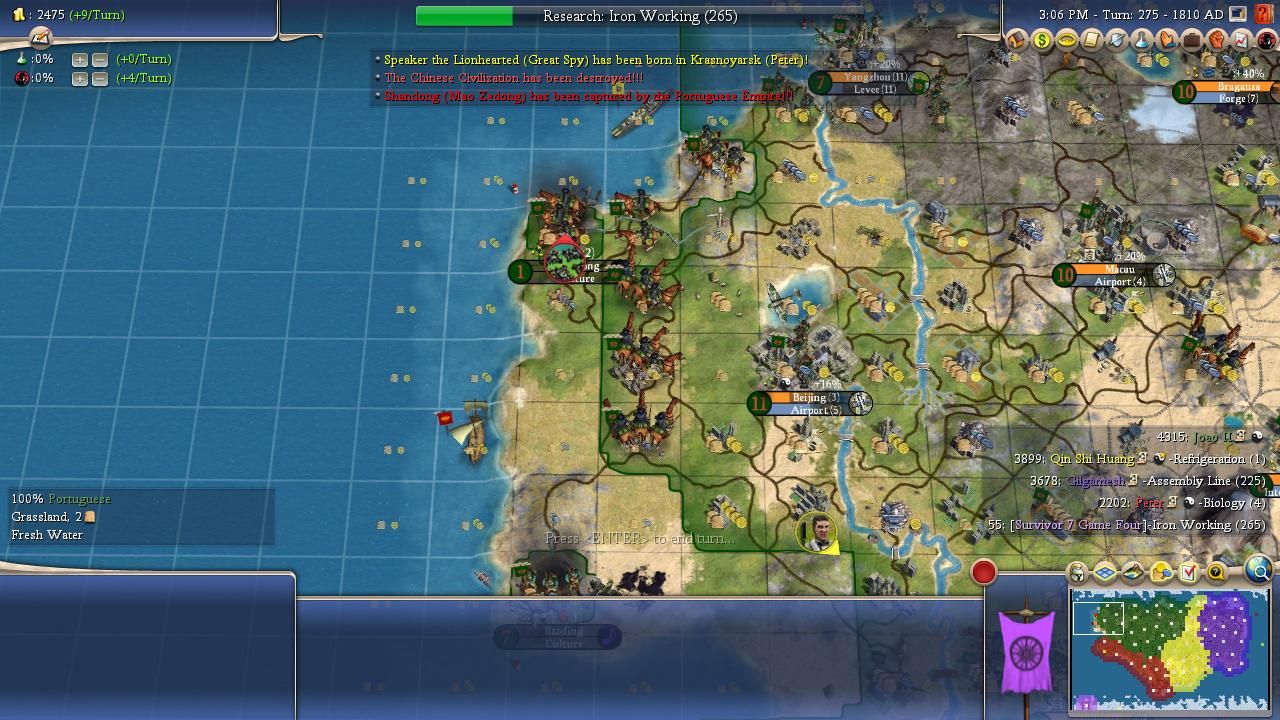
Joao wasn't exactly carrying out an efficient conquest, though. He took two Russian core cities, including the capital, before choosing to sign peace with Peter (in exchange for Peter's last ex-Korean city) and turn his efforts to Mao instead. The problem was, his Stack of Doom was still stuck in Moscow! This led to a period with little happening, as Mao's army was seriously outclassed (Portugal having unlocked rifles and cavs by now while he still lacked gunpowder), but Joao wasn't seriously pushing an attack. Eventually, though, he signed Open Borders with Peter again, and with his big stack back in action, the rout was on. Mao still managed to hold on for an impressively long time, teching Rifling with three cities left to further slow the Portuguese assault. Unfortunately, his eastern hideout, taken from Sitting Bull long ago, either flipped or was gifted to Qin, and so he had nowhere to hide once Joao eventually pushed through those last three cities for Mao's second career opening round exit. Mao didn't have a great starting position in this game, and never did much of anything with it. He was behind from the end of the landgrab on, the only surviving leader to not get meaningful gains in the opening set of wars, and after that had no hope of victory. And once he finally made a big move, it was a failed backstab against a superior foe, ultimately a fatal mistake. This wasn't even a performance worthy of the Wildcard game, and so Mao's season is over.
As this war was winding to its close, there were still three leaders who each had a realistic path to victory. Joao now clearly led the biggest civilization, and was virtually guaranteed a top two spot. His tech pace had been hampered significantly by the long war, but he had a very real shot at a Diplomatic victory after Gilgamesh built the UN. Qin and Joao were thick as thieves, and while they only had 59% of the world's population at the first vote, that could grow and give J-man the victory. Gilgamesh, meanwhile, was fully on the cultural path now, flipping on the slider shortly before Mao's death, and he was less than 50 turns from an outright victory. If nobody did anything else before too long, he would win. The biggest variable now was Qin: he had a significant tech lead by this point and was the favorite if the game went to space, but with Joao much bigger, he would be stuck in the wildcard game unless he did something about Gilgamesh. He very much had the ability to, possessing infantry and tanks while Gilgamesh was still fielding rifles and no longer researching, and he had delayed the Sumerian culture train by building most of the cultural wonders at Radio and Mass Media. The big question was if he would take action, or if his peaceful tendencies would rule the day as he let a playoff spot slip away. Oh, and Peter was around as well, hopelessly behind and stuck praying that the game would end before Joao decided to finish the job he had started earlier.
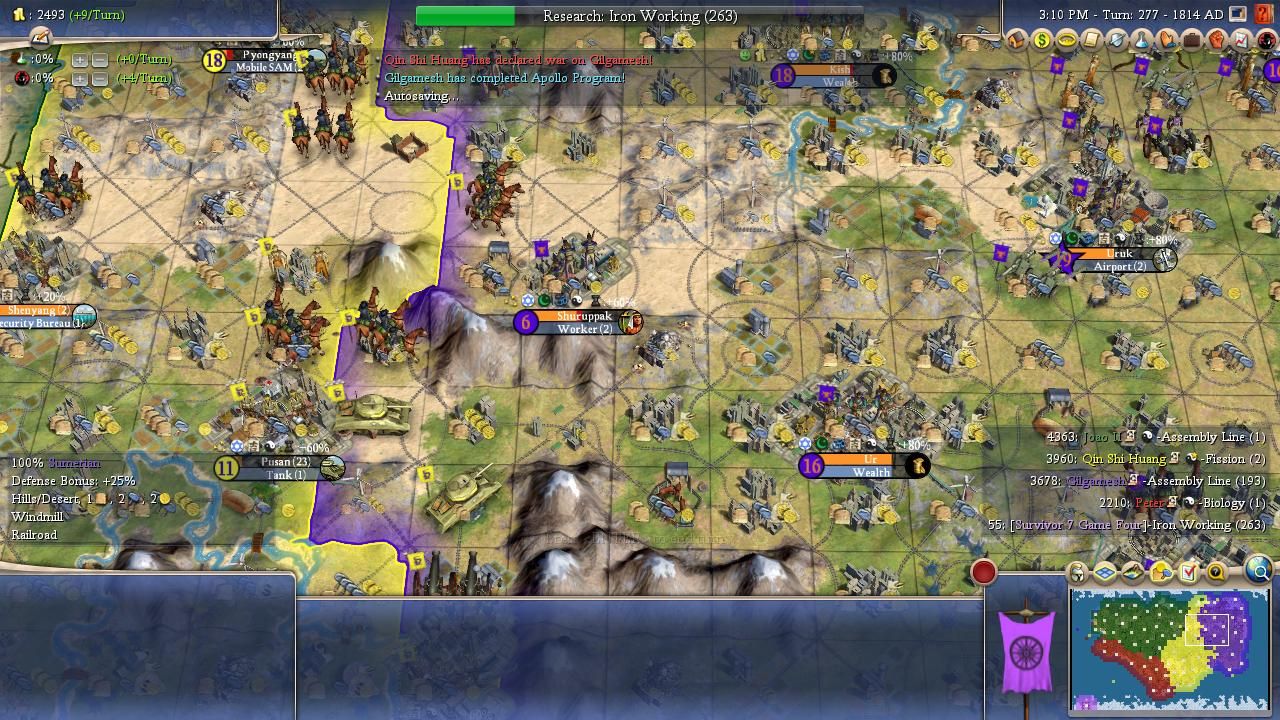
As it turned out, the most suspense came in the period shortly before Mao's elimination. By the time he was off the map, Qin had started plotting war, and he was Friendly towards everybody except Gilgamesh, so his intent was pretty clear. Just a few turns after Joao finished his conquest, Qin came crashing over the Sumerian border to put the cultural attempt to an end. Gilgamesh acted fast, turning research back on and quickly picking up Assembly Line for infantry, but Qin was still up tanks, fighters, bombers, and MOBILE artillery - he clearly had the upper hand here, and Sumerian cities started to fall very quickly. But then salvation came for Gilgamesh, as Joao called a fateful UN resolution:
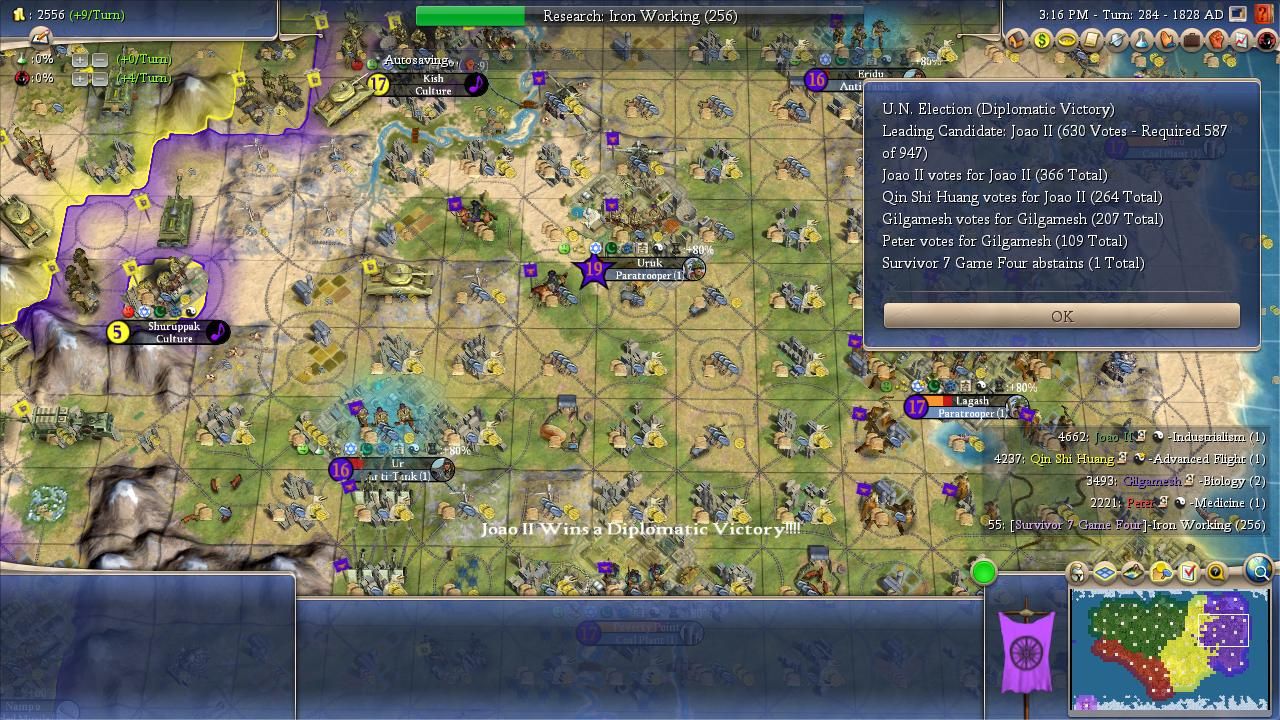
Diplomatic victory for J-man! With Mao gone and Gilgamesh starting to lose cities, the Joao-Qin coalition now had enough votes to easily get this vote through and bring the game to a close. This was an impressive performance from a leader who had seemed like a dead man walking entering the game. Joao had been lucky to have his western neighbors prioritize peaceweight over border tension and thus leave him alone early on, but aside from putting off culture for too long, he also played a legitimately great opening, settling a ton of cities, picking up a couple more from Korea, and thus putting himself in a frontrunning position from the end of the landgrab on. His favorable diplomatic situation was a necessary part of his win, but so were his own actions in the early game. Then he truly earned his playoff spot by not only surviving a two-front war, but turning the tables on his attackers and outright eliminating one of them to become by far the biggest nation on the map. True, he didn't leverage his advantage as well as a better leader might, and so needed the UN to actually win the game, but this was still an astonishingly good outing for a leader who rarely accomplishes much. Joao is back to the playoffs for the first time since Season 2, and if nothing else, he'll be alongside Hammurabi for another friendly face - or meat shield.
Meanwhile, Qin took the initiative and was rewarded with his own playoff spot; he moves on in second place and would have been the likely winner had the UN not been a thing. While Qin's opening was far from fantastic, he was able to pull off the critical securing and spreading of his own religion, and he handled the rest of the game quite capably. Just when he'd been in danger of falling out of contention, he backstabbed Wang and got the biggest share of Korea to get right into the thick of things, weathered a midgame attack from Gilgamesh with no significant losses, and became the tech leader in the late game on the power of his well-spread religion. Once it became a tight race for first, he did not just sit back and watch a playoff spot slip away, but instead took matters into his own hands and ensured that he, and not Gilgamesh, would be moving on. Much like Joao, Qin didn't do as great of a job from this position as some leaders might, but he still had one of the best games of his career and very much deserved his playoff ticket. He'll be going up against Gandhi and Alexander in a game that's starting to look quite interesting, to say the least.
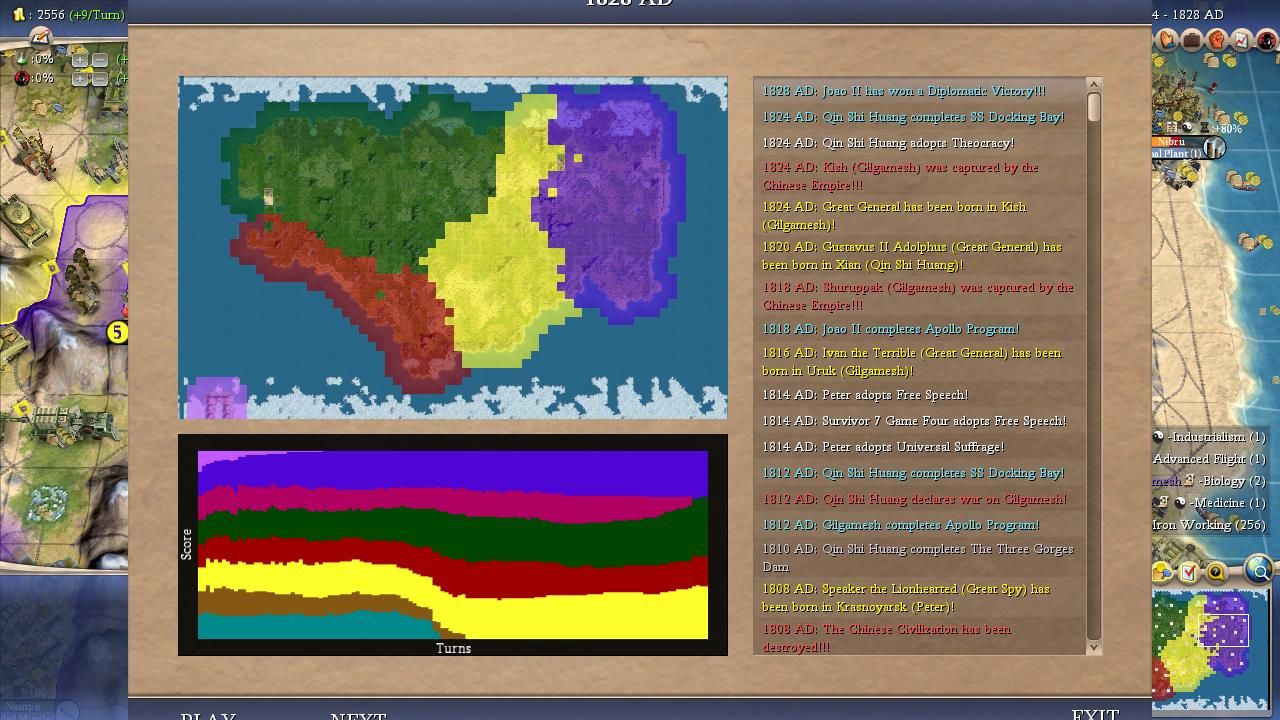
Finally, Gilgamesh and Peter both managed to survive to the wildcard game, giving Shaka some company at last. Gilgamesh had a fantastic starting position in this game, and his performance was frankly underwhelming. It seemed like he should have been a runaway and simply snowballed off Sitting Bull, but both before and after that conquest he simply wasn't as far ahead as expected. Part of that was a bit of simple bad luck that left him stuck next to the two most powerful other nations after Sitting Bull's demise, with no more easy conquests, but it also did legitimately seem like he didn't play as well as he ought to have, leaving himself out of options. His decision to backstab Qin in the midgame also turned out to be a horrible one, making an enemy of his neighbor to no gain and setting the stage for Qin to strike back at the end, and just like last season, he was lucky the game ended when it did before he could get knocked out completely. Still, he played a very solid game throughout and had a very real shot of winning until the closing turns - this was a performance that merited a second chance. The same cannot be said for Peter, whose performance was truly embarassing. He had an opening virtually identical to Joao's, similarly doing a great job of expanding, but while J-man converted that into a leading position and later conquered his way to a secure playoff spot, Peter failed to develop his nation as well, and later lost a war despite being on the good side of a 2v1. He was very lucky that Joao decided to kill Mao instead of him, and while he did unquestionably do better than the three leaders he beat out, his performance was a far cry from those of the other three.
This ended up clocking in as the fastest AI Survivor game so far this season, taking less than three hours from start to finish, but it certainly packed a lot of interest into those three hours. The unusually incompetent openings on display, the sudden collapse of Korea, the failed 2v1 war, and a three-way race for first that was uncertain until the end combined to make for a riveting game, and it ended with yet another unexpected result. Two more unseeded leaders came out on top, as we have yet to see a single Pool One leader finish in the top two. Will Kublai Khan finally break the curse in Game 5? It should be a fun ride in any case. Thanks as always to all who make AI Survivor possible.



